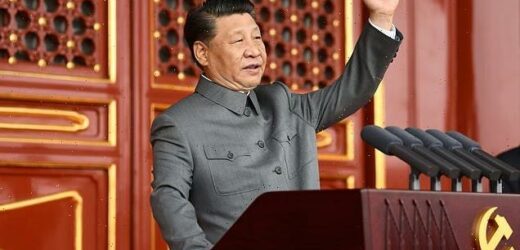China wants to get a stranglehold on our vital energy supplies – but we CAN stop them, say LIAM FOX and ROBERT MCFARLANE in a warning from two big beasts on either side of the Atlantic
The highest priority for any sovereign government is the protection of its citizens from danger – foreign and domestic. We count on our government to be watchful.
It is troubling then how lax we have become since the end of the Cold War, despite the emergence of new international threats – not least those posed by the extraordinary rise of China and its ever-tightening grip on world affairs.
Beijing runs the second most powerful economy in the world and is a major trading partner for Britain and America. Many jobs rely upon the huge investments it has made. China has found its way into Britain’s strategic telecommunications, into our universities and our nuclear industry.
China and Russia are expanding into both Africa and South America, too, buying up stakes in mineral resources and energy distribution
Influential figures in the West want us to treat the Chinese as if they were equally responsible members of the global community, ignoring the serious threat to our way of life they already represent. But we must not allow ourselves to be lulled into a false sense of security about China’s world agenda.
For example, it is aiming for a stranglehold not just on essential minerals, but the energy supplies upon which our day-to-day existence depends. Despite its green rhetoric, china remains the world’s top polluter, reckless at home and irresponsible abroad.
Meanwhile, our democratic institutions are under threat from the authoritarian ‘state capitalism’ that it actively promotes around the world.
All this must be challenged.
China’s strategy for expanding its influence abroad – known internally as ‘unrestricted warfare’ – was adopted with the arrival in office of President Xi Jinping in 2013.
Its Belt and Road Initiative, as it is known, sounds benign enough but its purposes are unmistakable.
China has sought to dominate other nation states using predatory business practices and unaffordable loans that leave country after country heavily in debt. Through seductive offers to build infrastructure, China has secured control of critical resources, strategic terrain and access to distant markets. It seeks political and economic dominance through local dependency on Chinese goods and services.
Today, China owns 60 per cent of Congo’s cobalt, much of Chile’s lithium (for batteries), and ports in Sri Lanka, Greece, Italy and others spread throughout Europe.
Russia has followed suit, with contracts to build four nuclear power reactors in Egypt – agreements which allow the Russian navy to use the plants as refuelling bases.
The Russians are building two more nuclear reactors – also with access for the Russian navy – on the Turkish coast. Moscow already has a naval base at Tartus in Syria.
This collection of sites will give the Russians real influence over the eastern Mediterranean and the Suez Canal.
China and Russia are expanding into both Africa and South America, too, buying up stakes in mineral resources and energy distribution.
Today, China owns 96 ports around the world. Some of these are at key locations for maritime trade – which also means energy trade – giving Beijing strategic dominance without having to deploy a single soldier, ship or weapon.
This matters to Britain as we will remain dependent on internationally traded oil and gas for many years.
Our nuclear power supply is also compromised. We have already allowed China to invest in the new plant at Hinkley Point in Somerset and the proposed new reactor at Sizewell in Suffolk. And we are still considering whether to let the Chinese build a reactor at Bradwell-on-Sea in Essex. Surely this is a security threat – allowing the Chinese into the heart of such a sensitive sector for many decades to come?
Secure, clean, reliable energy is fundamental to every sovereign country. Without it, nothing grows. There is no industry, agriculture, education, housing, science or healthcare. It is a leading measure of a country’s national security.
Perhaps our Cold War ‘victory’ and the collapse of the USSR have made our leaders complacent to other threats.
True, President Xi appears outwardly less belligerent towards the West than, say, Stalin or Khrushchev and China acknowledges that a nuclear war could never be won and must never be fought. But the Soviet Union was an economic basket case. China is not and cannot be readily defeated or dismissed.
Meanwhile, the lessons of the Cold War have done nothing to diminish Xi’s appetite for authoritarian rule, human rights abuses, the attempt to recover ‘lost’ territories – or imperial ambition.
It is possible, too, that tackling climate change has distracted Western governments. Yes, it is the single most significant threat facing the planet today and we must find ways of reducing the amount of carbon we put into the atmosphere. This is the subject at the heart of October’s United Nations Climate Change Conference (COP26) in Glasgow.
But here, too, China is seeking to exploit the situation.
Today it is the dominant provider of wind and solar systems throughout the world. Yet the Chinese are equally happy to sell high-polluting forms of power generation, including coal-fired plants.
China is currently building at least 350 such plants, including seven in South Korea, 13 in Japan, 52 in India and 184 at home.
Britain has virtually eliminated coal from electricity generation and now produces only 1.01 per cent of global CO2, having reduced emissions by a world-leading 35.6 per cent since 1990.
In contrast, China produces about 29 per cent of global CO2 and has increased its emissions since 1990 by a whopping 353 per cent. It can export such filthy technologies at a competitive advantage because its manufacturing costs are so low, all the while undermining the climate targets it has signed up to and making a nonsense of Xi’s bold claims about reducing emissions.
It is telling that despite an extended deadline, China has yet to submit its updated emissions plans to COP26, which will be used to assess how much progress has been made towards the legally binding Paris Agreement on cutting CO2.
China has already gained dangerous leverage over the UK Government. In 2020, when the UK decided to refuse China’s offer of its 5G mobile telecoms system – due to the embedded security threats – China immediately threatened to withdraw from work on the Hinkley Point nuclear power plant, in which it is a major investor.
It threw Britain’s weakness into sharp relief.
Perhaps our Cold War ‘victory’ and the collapse of the USSR have made our leaders complacent to other threats
The journey to meet our climate change targets cannot possibly mean that Britain becomes a client state – let alone to such a dangerous foreign power as China
We need abundant and consistent electrical power – something that wind and solar farms cannot provide by themselves. There are times when the wind does not blow and the sun does not shine.
That’s why, if Britain wants to remain a civil nuclear power, it should not be looking to China for investment and solutions, but to its allies, particularly its fellow members of the Five Eyes group – Australia, Canada, New Zealand and the US.
Fortunately, such a solution is at hand. It lies in developing a new generation of nuclear power reactors that can provide abundant clean energy.
Rolls-Royce has supplied engines powered by nuclear reactors to the Royal Navy for decades. Our nuclear submarines run on such systems. The British engineering firm is now developing a new generation of versatile small modular reactors (SMRs) which will meet a variety of energy needs efficiently.
These remarkable systems will eventually be factory-built and assembled on site, putting the UK on a firmer footing.
The electricity they generate will be available 24/7 and won’t emit an ounce of carbon.
Most importantly, it will ensure Britain’s strategic independence.
The journey to meet our climate change targets cannot possibly mean that Britain becomes a client state – let alone to such a dangerous foreign power as China.
But we need more than wishful thinking. We still have time to act. The time to do so is now.
lDr Liam Fox is former Defence and International Trade Secretary. Robert McFarlane is a former National Security Adviser of the United States.
Source: Read Full Article





